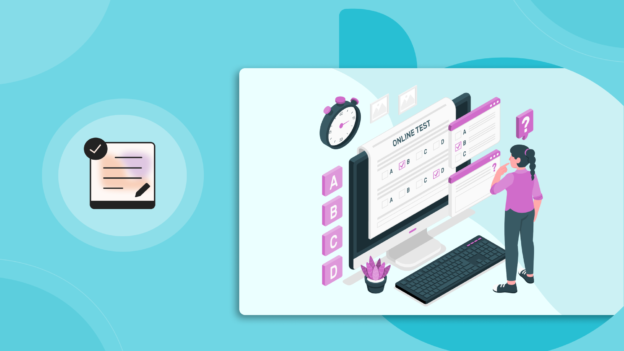It can be tough to get students motivated to learn, especially when they’re used to the traditional educational system. But there are ways to increase your student’s motivations to learn. In this article, we will share some of the ways you can increase the motivation of your students to keep learning as you progress through your online course.
What are the Different Types of Motivation in Education?
There are two main types of motivation. They are –
- Intrinsic Motivation
- Extrinsic Motivation
Let’s get to know about each of the types.
Intrinsic Motivation
Intrinsic motivation refers to motivation that comes from within oneself, as opposed to extrinsic motivation, which comes from external factors. Teachers can still help play a role in increasing the intrinsic motivation of a student. Intrinsic motivation is often driven by personal interest or enjoyment in the task itself. This type of motivation has been found to be more powerful than extrinsic motivation in predicting success and motivation levels.
In an ideal world, all students are self-directed to learn. But we don’t live in an ideal world. So extrinsic motivation still plays a big role in students’ learning.
Extrinsic Motivation
Extrinsic motivation is a form of motivation that comes from external factors, such as rewards or punishments. With extrinsic motivation, people are motivated to perform a behavior because they want to avoid a negative consequence or earn a positive reward.
The Ways To Increase Your Student’s Motivations To Learn
Let’s take a look at 10 ways you can increase your student’s motivation for learning. This list consists of both extrinsic and intrinsic motivation.
Make Your Class Interactive
Adding interactive elements to your class will make it more engaging and enjoyable for your students. Try incorporating quizzes and challenges into your online lessons. This will not only make the lesson more fun, but it will also help students retain information better.
Encourage Collaboration
Working together is a great way to learn. Encourage your students to collaborate with each other on assignments and projects. This will help them develop essential social skills and learn to work effectively in a team.
Give Your Students A Say
Letting your students have a say in how they learn can be a great motivator. Ask them for feedback on your lessons and give them the opportunity to suggest ideas for future lessons. This will show them that you value their input and that you’re willing to make changes to improve their learning experience.
Give Timely and Sensitive Feedback
Giving feedback is important, but it’s also important to do it in a way that is timely and sensitive. Make sure to give feedback that is specific, objective, and actionable. This will help your students feel supported and motivated to continue learning.
Provide Easy Access to Resources
If you want your students to be motivated to learn, you need to make sure they have easy access to all the resources they need. Put all your resources online in a central location so that students can easily find and use them.
Use a Variety of Instructional Methods
Using a variety of instructional methods will keep your students engaged and motivated. Try incorporating different types of activities into your lessons, such as videos, games, and simulations. This will help students learn in a way that is best for them.
Teach Enthusiastically
Your enthusiasm for the subject matter will be contagious! If you’re passionate about what you’re teaching, your students will be more likely to be motivated to learn.
Provide Concrete and Clear Examples
When you’re teaching, make sure to provide concrete and clear examples. This will help students understand the concepts you’re teaching and see how they can be applied in the real world.
Improve Student Autonomy
Giving students the opportunity to learn independently can be a great motivator. Encourage your students to take charge of their learning by setting goals and developing a plan to achieve them. This will help them feel more confident and empowered to learn.
How Does Motivation Impact Behaviour and Performance?
Motivation is a psychological process that drives individuals to achieve their goals. It is the force that drives people to action and is often linked to positive outcomes, such as increased productivity and improved performance.
There are various theories of motivation, which attempt to explain how and why people are motivated to do certain things. One of the most influential theories is the Drive Theory, which posits that people are motivated by a need to reduce tension or achieve a goal, and Incentive Theory, which suggests that people are more motivated by rewards or punishments.
Whatever the theory, it is clear that motivation is a powerful force that can impact behavior and performance. When people are motivated, they are more likely to put forth the effort required to achieve their goals. This can lead to better performance, both in terms of quality and quantity.
By understanding the role that motivation plays in behavior and performance, teachers can maximize their students’ potential to improve outcomes.
Conclusion
There are many ways to increase your student’s motivations to learn. By making your class interactive, encouraging collaboration, giving your students a say, and providing easy access to resources, you can create a learning environment that is motivating and enjoyable for your students.











 © All rights reserved, BUDDYBOSS LLC 2024
© All rights reserved, BUDDYBOSS LLC 2024





halo ini kh4t3m
Vidio Bocil 18+ Bokep
Link paling hoky saat ini hanya ada di https://chartersolutions.org/
Situs penyedia video orang bocil saat ini bokep jepang
Great Article bro, https://smpn4pengasih.sch.id/views/blog/ daftar sekarang
Daftar Resmi Sekarang Juga jacktoto Terpercaya
Daftar Resmi Sekarang Juga monperatoto Terpercaya
Great Article bro, https://pafiagamkota.org/ daftar sekarang
Daftar Resmi Sekarang Juga situs togel Terpercaya
Daftar bandar togelsyair hk Terpercaya
Daftar resmi situs toto disitus toto Terpercaya
Daftar resmi situs toto dimonperatoto Terpercaya
selamat datang di situs slot terbaik, slot tergacor daftar
selamat datang di situs slot terbaik, hongkong lotto daftar
selamat datang di situs slot terbaik, mahjong slot daftar
selamat datang di situs slot terbaik, situs toto slot daftar
selamat datang di situs slot terbaik, situs toto 4d daftar
selamat datang di situs slot terbaik, situs toto daftar
selamat datang di situs slot terbaik, hongkong lotto daftar
selamat datang di situs slot terbaik, link gacor daftar
Daftar sekarang resmi situs diprediksi hk Terpercaya
Daftar sekarang resmi situs dislot gacor Terpercaya
Daftar sekarang resmi situs toto dijacktoto Terpercaya
Daftar prediksi togelsyair hk Terpercaya
dari muka dunia, hilang kau dari muka bumi
dari muka dunia, sampai jumpa dari muka bumi
selamat datang di bandar togel online terbaik, situs toto resmi dan terpercaya
selamat datang di situs slot terbaik, https://ojs.uninus.ac.id/api/ daftar
selamat datang di situs slot terbaik, https://umcced.edu.my/toto/ daftar
selamat datang di situs slot terbaik, https://sih3.kepriprov.go.id/ daftar
great articlesitus togel Terpercaya
selamat datang di bandar togel online terbaik, toto togel resmi dan terpercaya
great articlesitus togel Terpercaya
Jangan meragukannya, dapakat segera disini Borak Asli
Great news! Cloud mining now releases the collected crypto ==>> https://ext-opp.com/BTC
Great news! Cloud mining now releases the collected crypto ==>> https://ext-opp.com/BTC
selamat datang di bandar togel terbaik, toto togel resmi dan terpercaya
great articletai kuda bokep